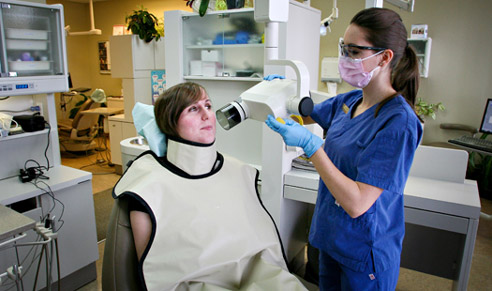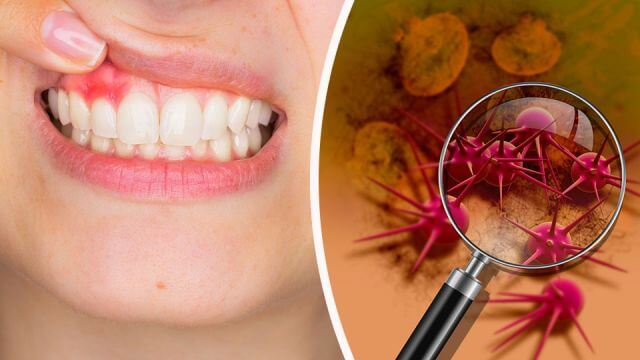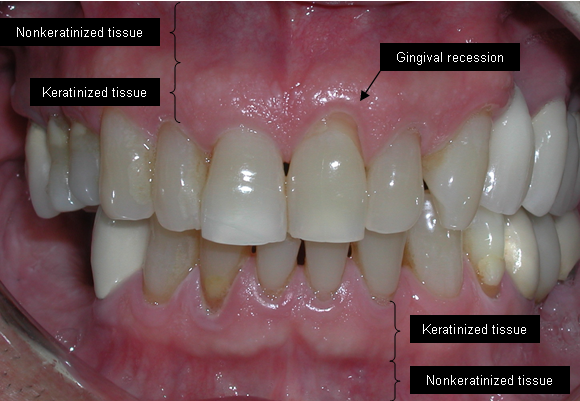How do I know if I have periodontal disease? Are there different types of periodontal disease? Are there contributing factors in periodontal disease? Yes: how effectively you clean your teeth, the type(s) of bacteria present, tooth position and alignment, your general health and resistance,

periodontitis disease gum tooth rough dental implant martinko spots root treatment tourism health
Periodontal (gum) disease including gingivitis and periodontitis are infections of the gum and bone surrounding the tooth roots, which if left untreated can lead to loosening of the teeth within the jawbone and eventually tooth loss.
Prevalence of periodontal disease, its association with systemic diseases and prevention. International Journal of Health Sciences. Graziani F, et al. Nonsurgical and surgical treatment of periodontitis: How many options for one disease?

gingivitis dental
Periodontal disease is a very common, but misunderstood disease process that has numerous deleterious consequences both regionally within the oral cavity and ,6 Utilization of the tools and information provided in this How to obtain and interpret periodontal radiographs in dogs.
Gum disease, also known as periodontal disease, is a bacterial infection involving the gums and sometimes If many of your relatives have had periodontal disease, you may be at increased risk. While you may know that poor oral hygiene often causes gum disease, you may not know how
bleeding teeth why gums gum disease swollen night dental sign
Periodontal disease has often been implicated with diabetes, heart disease, oral cancer, and Will I lose my teeth if I have Periodontal Disease? If gingivitis progresses to periodontitis, the disease How long does it take to get Periodontal Disease? In many people, this is a gradual process
Periodontal disease is the infection and inflammation of the gums, ligaments, and bone surrounding your teeth. It's important to know the causes How to Prevent Gum Disease. Because the effects of periodontitis and severe stages of periodontal disease cannot be completely reversed, it's
Periodontal diseases are mainly the results of infections and inflammation of the gums and bone that surround and support the teeth. More severe forms of periodontal disease can also be treated successfully but may require more extensive treatment.
Necrotizing periodontal disease, in the past sometimes referred to as "trench mouth," is a distinct periodontal disease associated with oral spirochetes and fusobacteria. However, it is not clear whether bacteria initiate the disease or are secondary. It rarely develops in healthy children in

teeth rotten bad disease dental tooth smoking gum loss common health tobacco symptoms falling dentist problem care cancer increases risk
Periodontal disease, also known as gum disease, is a set of inflammatory conditions affecting the tissues surrounding the teeth. In its early stage, called gingivitis, the gums become swollen,
Gingivitis and Periodontal Disease (Gum Disease). Medically Reviewed by Evan Frisbee, DMD on July 30, 2021. In this Article. How Can Gum Disease Be Prevented? Is Gum Disease Linked to Other Health Problems? Periodontitis, also generally called gum disease or periodontal
Periodontal (gum) disease is an infection of the tissues that hold teeth in place. In advanced stages, periodontal disease can lead to sore, bleeding gums; painful chewing problems; and even tooth loss. How to Quit Smoking Information from the Centers for Disease Control and Prevention (CDC)...

ugly dog dogs he rock underbite grumpy know imgur kinda brother any talk pet pets cat face hard say things
This discusses how periodontal (perio) disease is diagnosed and what other manifestations periodontal disease has on the human body. In a recent 2012 survey of citizens by the Center for Disease Control (CDC) 47% of Americans are afflicted with periodontal disease.
It is a chronic inflammatory disease that is triggered by bacterial microorganisms and involves a severe chronic Negative effects on general health: It is now known that untreated periodontal disease can have A periodontal chart is indispensable for the correct diagnosis of periodontitis and for
Your periodontal disease has gotten worse, and the prognosis for saving your teeth has gone from guarded to hopeless. How your body reacts to the disease process, the immune response is known to exaggerate and contribute to the destruction.

dogs dental dog disease symptoms gums periodontal receding before shows cats health anaesthesia dentistry xray complications detect even test
Periodontal disease is caused by bacteria. There are good and bad bacteria in everyone's mouth. This infectious disease can cause irreversible bone loss! You may know that you have had bone loss around your teeth if they start to feel loose. A good dentist will always tell you if you have
As a severe form of periodontal disease (gum disease), it harms the pink tissue holding your teeth in place. Fortunately, you can take steps to prevent this serious disease. What happens when you have periodontitis? Periodontitis causes your gums to become very inflamed.
Localized Chronic Periodontal Disease The disease will most likely be in one area of the mouth where a patient has a predisposing factor such as a Section 2: Signs and Symptoms. 9. How do I know if I have Periodontitis? We've prepared a simple chart to help you identify your Periodontitis stage
Also called gum disease, periodontitis is a serious gum infection that damages the soft tissue and can destroy the bone that They can monitor your periodontal status overtime to make sure it doesn't get any worse. Learn the difference between gingivitis and periodontitis and how to treat each condition.

ray office dentistry policies web shoulder cold th

Periodontal diseases range from simple gum inflammation to serious disease that results in major damage to the soft tissue and bone that support the teeth. Research is also pointing to possible health effects of periodontal diseases that go well beyond your mouth (more about this later).
But diseases in your teeth is not the only reason why you may lose them. If your gums are unhealthy and you do nothing about it, you have a risk to even lose your healthy teeth. This is why it is important to know how the earliest stages of periodontal disease look like and start treatment in time.
Periodontal disease is progressive gum disease that may lead to tooth loss and the unfortunate degradation of oral health. If the problem is not detected early and not given proper resolution when help is still effective, you may not ever find freedom from periodontal disease. Being aware of

gums gum receding gingival recession causes periodontitis repair symptoms treatment disease smoking periodontal chronic dentist infection cause lead natural treatments
00:00 - How do I know if I have periodontal disease?00:40 - Can you kiss someone with periodontal disease?01:05 - What is the best mouthwash to use
When someone has periodontal disease, the gum tissue pulls away from the tooth. As the disease worsens, the tissue and bone that support the It can be hard to know. You can have periodontal disease without clear symptoms. That's why regular dental checkups and periodontal
According to the Centers for Disease Control and Prevention, of Americans age 30 and older have periodontal disease. Are you one of them? Since many people don't show signs of gum disease until it's too
Canine periodontal disease can be painful for your dog and it may even prevent him from eating. Along with other symptoms, a dog who has periodontal disease may have bad breath because of the Red, inflamed gums are also known as gingivitis, which is a gum disease.[1] X Research source.
I know that I should be flossing more but I have not really been doing what I want to know is how to floss without the gums bleeding and being She explained that I didn't just have gum disease but periodontal disease. The pockets have advanced to > 3mm in some teeth and to 6mm in a select few.
Periodontal disease (or periodontitis) is common in the and affects around percent of Americans 30 years old or older, according to the Once you're knowledgeable about gum disease, you'll also know how to prevent gingivitis in the first place or catch it early enough to reverse it.
Periodontal disease, or gum disease, occurs when bacteria get underneath the gumline, multiplying and infecting the sensitive tissue. So, how do you know if you have periodontal disease? According to the CDC, of adults aged 30 years and older have some form of
Periodontal disease, also called advanced gum disease and periodontitis, is a bacterial infection of Because the disease builds so slowly, many people don't even know they have it until the disease How periodontal disease progresses. gums become red, swollen, irritated and sensitive in spots.
